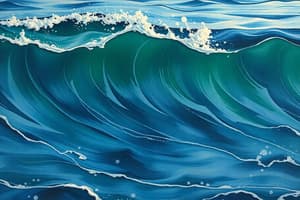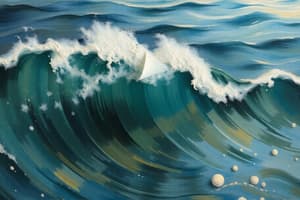Podcast
Questions and Answers
What is necessary for sound production according to the discussion of wave propagation?
What is necessary for sound production according to the discussion of wave propagation?
- Movement of water
- Vibration of particles in air (correct)
- Electromagnetic radiation
- High-frequency waves only
Which of the following statements about the properties of waves is true?
Which of the following statements about the properties of waves is true?
- Crest is the lowest point of a wave.
- Frequency and wavelength are directly related.
- Amplitude is the speed at which a wave travels.
- Wavelength is the distance between successive crests or troughs. (correct)
What is wave propagation primarily concerned with?
What is wave propagation primarily concerned with?
- The sources of waves only
- The energy waves carry
- The way waves travel or move (correct)
- The types of media waves pass through
Which of the following demonstrates an example of wave propagation?
Which of the following demonstrates an example of wave propagation?
What happens to the wavelength of a wave when the frequency increases?
What happens to the wavelength of a wave when the frequency increases?
What is the amplitude of a wave?
What is the amplitude of a wave?
Which of the following wave characteristics is inversely related to frequency?
Which of the following wave characteristics is inversely related to frequency?
What must occur for wave propagation to happen in any medium?
What must occur for wave propagation to happen in any medium?
What is the primary characteristic of longitudinal waves?
What is the primary characteristic of longitudinal waves?
Which factor does NOT affect the wave propagation speed of sound?
Which factor does NOT affect the wave propagation speed of sound?
What happens to electromagnetic waves when they pass from air to glass?
What happens to electromagnetic waves when they pass from air to glass?
Sound waves travel fastest in which of the following mediums?
Sound waves travel fastest in which of the following mediums?
What is the general effect of temperature on the speed of sound in a medium?
What is the general effect of temperature on the speed of sound in a medium?
Which of the following statements about mechanical and electromagnetic waves is correct?
Which of the following statements about mechanical and electromagnetic waves is correct?
Which factor makes it more challenging for sound waves to travel through a dense medium?
Which factor makes it more challenging for sound waves to travel through a dense medium?
Flashcards
Wave Propagation
Wave Propagation
The way waves travel or move.
Vibrations
Vibrations
The source of waves; something that moves back and forth repeatedly.
Wave Energy
Wave Energy
Energy carried by waves from one place to another.
Wave Frequency
Wave Frequency
Signup and view all the flashcards
Wave Amplitude
Wave Amplitude
Signup and view all the flashcards
Wavelength
Wavelength
Signup and view all the flashcards
Wave Speed
Wave Speed
Signup and view all the flashcards
Crest
Crest
Signup and view all the flashcards
Wave Propagation Speed
Wave Propagation Speed
Signup and view all the flashcards
Electromagnetic Waves
Electromagnetic Waves
Signup and view all the flashcards
Mechanical Waves
Mechanical Waves
Signup and view all the flashcards
Wave Propagation Medium
Wave Propagation Medium
Signup and view all the flashcards
Transverse Wave
Transverse Wave
Signup and view all the flashcards
Longitudinal Wave
Longitudinal Wave
Signup and view all the flashcards
Factors Affecting Wave Speed
Factors Affecting Wave Speed
Signup and view all the flashcards
Study Notes
Wave Propagation
-
Waves are disturbances or vibrations that travel from one place to another, carrying energy.
-
Examples of wave propagation include water ripples, sound waves, seismic waves, and electromagnetic waves.
Wave Properties
-
All waves have frequency (number of waves per unit time), amplitude (maximum displacement), and wavelength (distance between successive crests/troughs).
-
Frequency and wavelength are inversely related; higher frequency means shorter wavelength.
-
Wave speed (v) is calculated as: v = fλ (where f is frequency and λ is wavelength).
-
Electromagnetic waves travel at a constant speed of 3.0 × 10⁸ m/s in a vacuum. Sound waves travel at approximately 343 m/s in dry air at 20°C.
Wave Medium
-
Mechanical waves (like water waves, sound waves, and string waves) require a medium to travel through.
-
Electromagnetic waves (like light, radio waves) do not need a medium. They can travel through a vacuum.
-
Wave speed in a medium is affected by the properties of the medium (e.g., density, tension).
Factors Affecting Wave Speed
-
Mechanical waves (e.g., waves in a string): Tension and mass per unit length affect speed. Higher tension means faster speed, higher mass (per length) means slower speed.
-
Sound waves: Rigidity and density of the medium affect speed. More rigid materials mean faster sound, and denser materials mean slower sound. Temperature also affects speed - higher temperature means faster sound.
Wave Types
-
Transverse waves: Particle vibration is perpendicular to wave propagation. Examples include light waves, electromagnetic waves, and S-waves.
-
Longitudinal waves: Particle vibration is parallel to wave propagation. Examples include sound waves, and P-waves (a type of seismic wave).
Studying That Suits You
Use AI to generate personalized quizzes and flashcards to suit your learning preferences.



